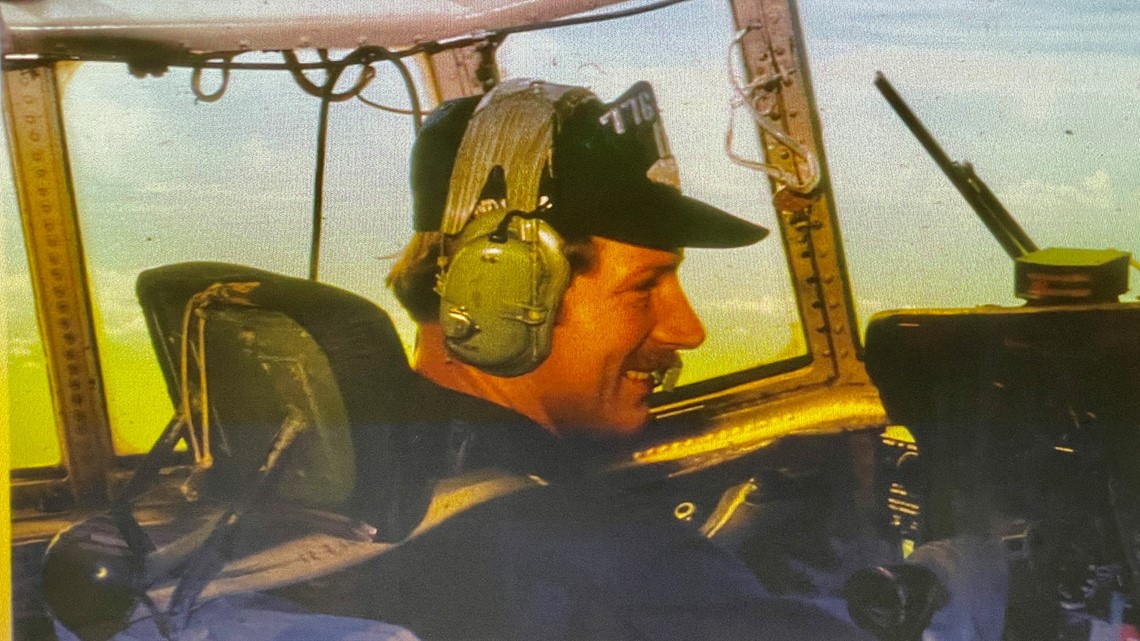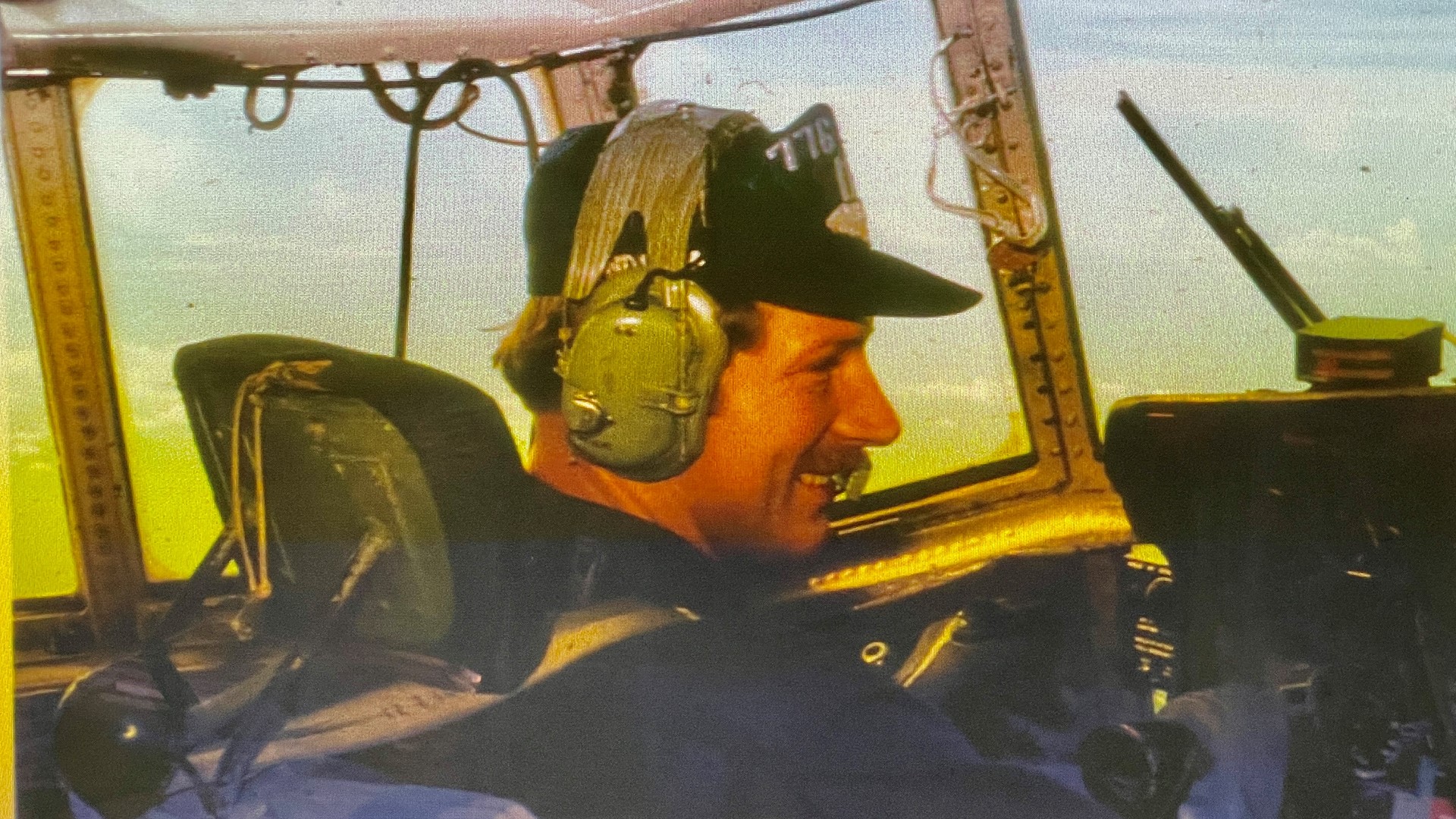KNOXVILLE, Tenn. — A C-130 combat pilot and veteran of 72 combat missions in Vietnam said the enemy fired on his hulking four engine cargo plane on every landing and takeoff but he never found a bullet hole in his plane.
“My angels have been watching over me. That's all I can say. I've been very, very fortunate. I've been very blessed,” said Jim Warner, a 20-year veteran of the Air Force who earned the military’s highest award for heroics in the sky in 1972.


“I was just doing my job. Just like the rest of the guys. I didn't do anything special,” said Warner holding his citation for The Distinguished Flying Cross.
It reads in part:
Captain James B. Warner distinguished himself by extraordinary achievement while participating in aerial flight as a C 130 pilot for the 776 tactical Airlift Squadron at song B field Republic of Vietnam on five June 1972. on that date, Captain Warner flew to combat sorties of medical supplies ammunition and food to the besieged forces at song be, although underground fire with heavy weather, the night landing was successfully completed and numerous refugees were evacuated to safety, the professional competence, aerial skill and devotion to duty displayed by Captain Warner reflect great credit upon himself in the United States Air Force.
In addition to our on-camera interview about his actions on that particular mission, Mr. Warner also took time to answer the following 10 questions about the impact his military service had on the rest of his life.
1. What one person influenced you most in life?
My Dad was my hero. He was a rocket scientist, and he set the standard for service to others. He took our family places, showed us the U.S., and taught me how to make and repair things. He had high moral standards, integrity, honesty, and character, and taught me those same values.
2. Do you feel honored and respected for serving your country?
I do now. Not necessarily during the Vietnam War era. I was never treated badly like many of my fellow American Legion and VFW friends were. We had strong, well respected Veteran organizations in Naperville, IL, where I spent 17 years after retiring from the Air Force. I believe East Tennessee does a fantastic job of honoring Veterans, thanks to many Veteran organizations, school and government programs, and John Becker’s Service and Sacrifice program.
3. How can people thank you for your service?
Vote! Vote responsibly! Many people vote either on a party line because “That’s the way they’ve always voted,” or vote on one “Hot Button” issue, or vote based on emotion. I suggest evaluating all the issues and the candidates’ values, integrity, honesty, track record, leadership, and the party’s stand on those issues. Then make an informed, responsible vote.
4. How do you honor your fellow service men and women?
By serving leadership roles in Service Organizations. One of the things I’ve done for many years is relay military and veteran information via email to many (250 or 300 or more) veterans and veteran-friendly associates.
5. How do you think this generation of military men and women is different or similar to yours?
They are smarter. And there are more women in the service. During my era, men were drafted, but going to an all-volunteer service was an outstanding move on the part of our government. Young men and women make informed decisions to enlist in the service. They aren’t drafted. And they aren’t forced into the service by a judge who gives them a choice: jail or the military. Those people do not make good soldiers.
6. What influence did your military service have on the rest of your life?
The military taught me a lot about leadership, and it gave me a greater appreciation for my country. It taught me much about serving others and putting others before self.
7. Does your family have a history of military service?
Some. My brother was in the National Guard for seven years. One cousin was in the Air Force and retired after a full career as a jet engine mechanic. A couple of other cousins were in the Air Force for a time. My wife’s grandfather was in WWI as an ambulance driver. My Dad’s work in rocket research at Purdue University was more valuable to our country than his serving in the Army would have been.
8. Would you encourage younger generations in your family to join the service?
Yes, I would. There are so many opportunities and skills and training available, only through the military. One good thing that all military branches instill is discipline! And, there is the opportunity to have a complete career in the military and then go on to a civilian career after the Service.
9. How has your opinion of war changed?
War is one means of international diplomacy. War happens as a failure of all other forms of diplomacy. Our country’s leadership failed and got us into the Vietnam War. That war was run politically, and not by military leadership. I believe that has changed in that our military leadership has more control over the battlefield. Military leadership is more trusted now. War is never a good thing. Having seen it and been in war, it is definitely a bad thing and seldom yields positive results on an international scale.
10. How did your military experience shape your religious faith?
I was brought up in a Christian home, so I’ve always had a fairly strong faith. I believe my faith is stronger, now. I made some poor decisions along the way while in the military, but I managed to survive most of them fairly well. I knew that God had a purpose for me in life, and my angels sometimes worked overtime protecting me. I am incredibly fortunate to have lived this long (age 75), more or less unscathed.

